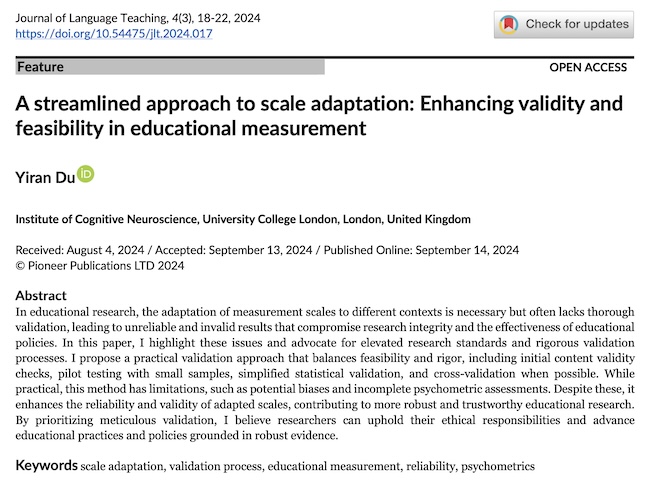A streamlined approach to scale adaptation: Enhancing validity and feasibility in educational measurement
DOI:
https://doi.org/10.54475/jlt.2024.017Keywords:
scale adaptation, validation process, educational measurement, reliability, psychometricsAbstract
In educational research, the adaptation of measurement scales to different contexts is necessary but often lacks thorough validation, leading to unreliable and invalid results that compromise research integrity and the effectiveness of educational policies. In this paper, I highlight these issues and advocate for elevated research standards and rigorous validation processes. I propose a practical validation approach that balances feasibility and rigor, including initial content validity checks, pilot testing with small samples, simplified statistical validation, and cross-validation when possible. While practical, this method has limitations, such as potential biases and incomplete psychometric assessments. Despite these, it enhances the reliability and validity of adapted scales, contributing to more robust and trustworthy educational research. By prioritizing meticulous validation, I believe researchers can uphold their ethical responsibilities and advance educational practices and policies grounded in robust evidence.
References
Bateson, M., & Martin, P. R. (2021). Measuring behaviour: An introductory guide (4th ed). Cambridge University Press. DOI: https://doi.org/10.1017/9781108776462
Clark-Carter, D. (2019). Quantitative psychological research: The complete student’s companion (4th Edition). Routledge. DOI: https://doi.org/10.4324/9781315398143
Finch, W. H., & French, B. F. (2019). Educational and psychological measurement. Routledge. DOI: https://doi.org/10.4324/9781315650951
Frank, M., Braginsky, M., Cachia, J., Coles, N., Hardwicke, T., Hawkins, R., Mathur, M., & Williams, R. (2024). Experimentology: An open science approach to experimental psychology methods. MIT Press. https://doi.org/10.7551/mitpress/14810.001.0001
Harrison, V., Kemp, R., Brace, N., & Snelgar, R. (2022). SPSS for psychologists (Seventh edition). Bloomsbury Academic.
Hopkins, K. D. (1998). Educational and psychological measurement and evaluation (8th ed). Allyn & Bacon.
Lingard, B. (2013). The impact of research on education policy in an era of evidence-based policy. Critical Studies in Education, 54(2), 113–131. https://doi.org/10.1080/17508487.2013.781515 DOI: https://doi.org/10.1080/17508487.2013.781515
Morgado, F. F. R., Meireles, J. F. F., Neves, C. M., Amaral, A. C. S., & Ferreira, M. E. C. (2018). Scale development: Ten main limitations and recommendations to improve future research practices. Psicologia: Reflexão e Crítica, 30(1), 3. https://doi.org/10.1186/s41155-016-0057-1 DOI: https://doi.org/10.1186/s41155-016-0057-1
Ramsey, F. L., & Schafer, D. W. (2013). The statistical sleuth: A course in methods of data analysis (3rd ed). Brooks/Cole, Cengage Learning.
Rossier, J., & Duarte, M. E. (2019). Testing and assessment in an international context: Cross- and multi-cultural issues. In J. A. Athanasou & H. N. Perera (Eds.), International handbook of career guidance (pp. 613–637). Springer International Publishing. https://doi.org/10.1007/978-3-030-25153-6_28 DOI: https://doi.org/10.1007/978-3-030-25153-6_28
Stewart, A. L., Thrasher, A. D., Goldberg, J., & Shea, J. A. (2012). A framework for understanding modifications to measures for diverse populations. Journal of Aging and Health, 24(6), 992–1017. https://doi.org/10.1177/0898264312440321 DOI: https://doi.org/10.1177/0898264312440321

Downloads
Published
Issue
Section
License
Copyright (c) 2024 Journal of Language Teaching

This work is licensed under a Creative Commons Attribution 4.0 International License.




